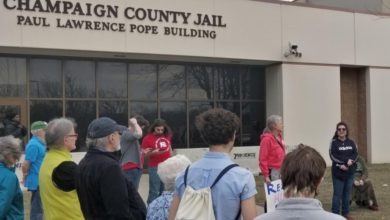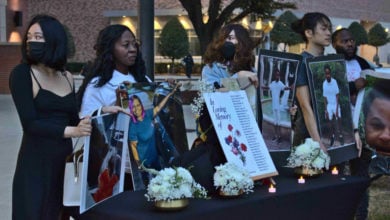Originally published in the San Francisco Bay View, Oct. 11.
Oakland – With the second phase of a massive California
prisoner hunger strike in its third week, prisoners have begun to report
grave medical issues. “Men are collapsing in their cells because they
haven’t eaten in two weeks,” says a family member of a striker at
Calipatria state prison.
“I have been told that guards refuse to respond when called. This is clearly a medical emergency.”
In an effort to isolate prisoners perceived by the California
Department of Corrections and Rehabilitation (CDCR) to be leaders, some
prisoners at Pelican Bay have been removed from the Security Housing
Unit (SHU) to Administrative Segregation (Ad-Seg). The Prisoner Hunger
Strike Solidarity Coalition has received reports that prison officials
have been attempting to freeze out strikers held in the Ad-Seg Unit at
Pelican Bay, using the air conditioning system in conjunction with cold
weather conditions where the prison is located.
Last week a hunger striker in Pelican Bay was taken to a hospital in
Oregon after he suffered a heart attack. Prisoners have also been denied
medications, including prescriptions for high blood pressure.
The CDCR has been treating the current strike, which began on Sept.
26, as a mass disturbance and has refused negotiations. “The prisoners
are saying that they are willing to take this to death if necessary to
win their demands,” says Dorsey Nunn, executive director of Legal
Services for Prisoners with Children and a member of the mediation team
working on behalf of the prisoners.
“Any deaths that result from the men starving themselves will be on
the hands of the CDCR. We are at a point where we are calling on the
media to make inquiries on prison protocol if and when prisoners begin
to die. If they want to avoid that kind of scenario, the CDCR can start
negotiating.”
Prisoners at Corcoran have stated, “Due to what they have done here
to us, some men have stopped drinking water completely, so we may well
be close to death in a few days.”
Prisoners and advocates have expressed serious concerns about the
state of medical care in Corcoran, Calipatria, Pelican Bay and Salinas
Valley, where the strike continues. Dr. Michael Sayre, who is the chief
medical officer at Pelican Bay, was sued successfully by a prisoner in
2009 for knowingly disregarding his severe medical needs. In addition,
Sayre was also investigated and disciplined surrounding the death of a
prisoner in Washington State in 1992 during surgery.
“The California prison system is in federal receivership in part due
to the substandard medical care provided inside,” says Terry Kupers,
M.D., a member of the mediation team and an expert on prison health
issues. “It is my professional opinion that the hunger strikers are not
receiving the care that they need and that their conditions could be
exacerbated by the CDCR, especially if force-feeding comes into play.”
Force-feeding is a common practice used against prisoners who refuse
to eat and can involve forcing a tube into the person’s stomach via the
nose. The practice has been widely condemned as torture by hundreds of
doctors worldwide.
For continued updates and more information, go to http://www.prisonerhungerstrikesolidarity.wordpress.com
Isaac Ontiveros of Critical Resistance, a national grassroots
organization working to abolish the prison industrial complex, is a
spokesperson for the Prisoner Hunger Strike Solidarity Coalition.
Emergency action to support the California Prisoner Hunger Strike
On Friday, Oct. 14, 10:30 a.m.‐1 p.m., at McAllister and Van Ness in
San Francisco, prisoners’ families and other supporters will tell CDCR
and Gov. Jerry Brown to meet the five core demands.
rain! And the thousands of prisoners on hunger strike were definitely on
the agenda.
Hundreds of prisoners around California are entering the third
week of their hunger strike. CDCR refuses to negotiate with the
prisoners, but the department still has not adequately addressed their
five core demands. Many prisoners have said they will strike to the
death in order to maintain their rights as human beings and stop the
torture they are experiencing.
Call Gov. Jerry Brown at (916) 445‐2841 or fax him at (916) 558‐3160.
We aim to make 160,000 calls by Friday, Oct. 14, one for every prisoner
in California!
Five Core Demands
1. End to group punishment and administrative abuse.
2. Abolish the debriefing policy, and modify active/inactive gang status criteria.
3. Comply with Commission on Safety and
Abuse in America’s Prisons 2006 recommendations regarding an end to
long-term solitary confinement.
4. Provide adequate and nutritious food.
5. Expand and provide constructive programming and privileges for indefinite SHU status prisoners.
CDCR has tried to break the strike by:
• Banning family member and legal visits.
• Confiscating mail.
• Taking away all medications.
• Taking away canteen items.
• Turning on the air conditioner to keep cell temperatures cold.
• Removing prisoners to Administrative Segregation.
• Issuing disciplinary actions.
And yet, the hunger strikers remain strong.
There are 1,111 prisoners in the SHU at Pelican Bay. Over 513 have
served 10 years or more in the SHU. Of those, 78 have been in the SHU
for 20 years or more; 544 have been in the SHU more than five years but
fewer than 10 years.
Take action!
Call Gov. Jerry Brown, CDCR Secretary Matthew Cate and your state
representatives and urge them to negotiate with the prisoners and honor
their demands:
• Gov. Jerry Brown, (916) 445-2841
• CDCR Secretary Matthew Cate, (916) 323-6001
• Holly Mitchell, Assembly member from Los Angeles, (310) 342-1070
• Tom Ammiano, Assembly member from San Francisco, (415) 557-3013
• Curt Hagman, Assembly member from Chino Hills, (909) 627-7021
• Nancy Skinner, Assembly member from Berkeley, (916) 319-2014





